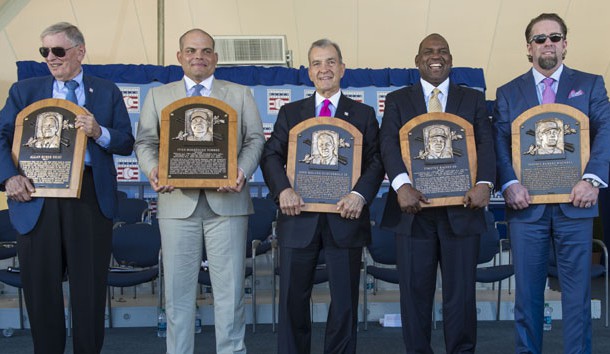
Jul 30, 2017; Cooperstown, NY, USA; Hall of Fame Inductee Bud Selig, Hall of Fame Inductee Ivan Rodriguez, Hall of Fame Inductee John Schuerhotz, Hall of Fame Inductee Tim Raines and Hall of Fame Inductee Jeff Bagwell pose with their Hall of Fame plagues after the induction ceremony at Clark Sports Center. Photo Credit: Gregory J. Fisher-USA TODAY Sports
COOPERSTOWN, N.Y. — Tim Raines made his major league debut in 1979, retired in 2002, played the bulk of his career in the relative anonymity of Montreal and spent the maximum 10 years on the Hall of Fame of America ballot before gaining enshrinement.
So what was an extra three-hour wait and a rare assignment in the five-hole for Raines on the day he finally completed his protracted path to baseball immortality?
Raines was an appropriate final speaker Sunday, when the perseverance and persistence of the five newest Hall of Famers — Raines was joined by fellow former players Jeff Bagwell and Ivan Rodriguez as well as two-time World Series-winning general manager John Schuerholz and ex-commissioner Bud Selig — was rewarded underneath a blazing sun and in front of 27,500 people at Clark Sports Center.
Raines, who ranks fourth all-time in stolen bases (808) and is among the top 50 all-time in walks and times reached base, is the first player to be inducted in his final year of eligibility on the baseball writers’ ballot since Jim Rice, who was elected in his 15th try in 2009.
“I’ve been asked that question for the past 10 years: ‘What is the reason why you haven’t gotten in?'” Raines said. “Thank God I don’t have to answer that question anymore.”
Reaching the Hall of Fame was the furthest thing from the teenaged minds of Raines, Bagwell and Rodriguez. Raines was better known for his football and track exploits as a high schooler in Florida, an upbringing he pondered when he joined the Expos at Wrigley Field prior to his major league debut.
“I swear to God, that was the most nervous I’ve ever been in my life — Wrigley Field, first time in the big leagues, 19 years old, just turning 20, from Sanford, Florida,” Raines said. “Wow.”
Bagwell grew up in cold-weather Connecticut, where he listened to his parents’ advice to never quit — on or off the field — as he tried to realize his dream of playing for the hometown Boston Red Sox.
“I wish I had quit a couple of jobs that I had — dishwasher at Friendly’s in Cape Cod,” Bagwell said, referring to the New England chain of restaurants. “I should have quit that. Sometimes I probably should have quit baseball, too.”
Bagwell was plenty self-deprecating Sunday — he later said, “I love playing baseball, but I don’t love stinking and I don’t love having 0-fers and stuff like that” — but he parlayed a 1990 trade from the Red Sox to the Astros into a 15-season career in Houston, for whom he batted .297 with 449 homers and 202 stolen bases. The latter figure is the most ever for a player who spent most of his career at first base.
As a child, Rodriguez, nicknamed Pudge because of his diminutive nature, used to try to increase his height via unorthodox measures.
“Tell them about a short kid who was hanging from the rope when I was a little kid, dangling there, trying to stretch himself and hoping to become as tall as the other boys,” Rodriguez said.
Rodriguez ended up as one of the best all-around catchers in baseball history and the position’s leader in hits (2,844), games caught (2,427) and Gold Gloves (13), mostly with the Texas Rangers.
“Well, look at me,” a teary-eyed Rodriguez said at the end of his speech. “The kid hanging from that rope, the kid they called Pudge — I am here on this stage in this special place, this baseball heaven called Cooperstown.”
Schuerholz’s path to building World Series winners with the Kansas City Royals and the Atlanta Braves began in college, when a tryout with his hometown Baltimore Orioles ended in unceremonious fashion.
“The start of the second day, (a scout) calls me over, and without saying a word, quickly hands me a camp roster and quickly hands me a stopwatch and says to me, ‘Schuerholz, I want you to get accurate home-to-first running times on every one of these position players left in this camp,'” Schuerholz said.
“Bam. Without saying much more, the message of my life was delivered. I’d better concentrate some place other than trying to be a professional baseball player.”
Selig, who tried several times to bring a baseball team to Milwaukee before buying the Seattle Pilots and moving them to Wisconsin in 1970, learned about perseverance as baseball’s commissioner from 1992 through 2014. He led the sport during an eventful period that included the season-killing strike of 1994 and the influx of PEDs as well as his attempts to restore the game’s popularity and integrity.
“The 1994 strike was the most painful experience of my life,” said Selig, who was lightly booed during his speech. “I began to experience what Harry Truman meant when he said, ‘The buck stops here.’ I experienced it again later when it became apparent that the players’ use of performance-enhancing substances was undermining the integrity of the game.
“I can tell you that having the buck stop at your desk is not necessarily a good feeling, but it is a responsibility that comes with positions of leadership.”
NOTES: Bud Selig turned 83 Sunday and became the first Hall of Famer inducted on his birthday. … A moment of silence was held in honor of Hall of Famer Jim Bunning, who died in May. … Next year’s class is likely to be plentiful as well, with Atlanta Braves icon Chipper Jones and 600-homer club member Jim Thome strong candidates to gain enshrinement in their first year on the ballot and returnees Trevor Hoffman and Vladimir Guerrero expected to reach the required 75 percent of the vote after near-misses this year.


